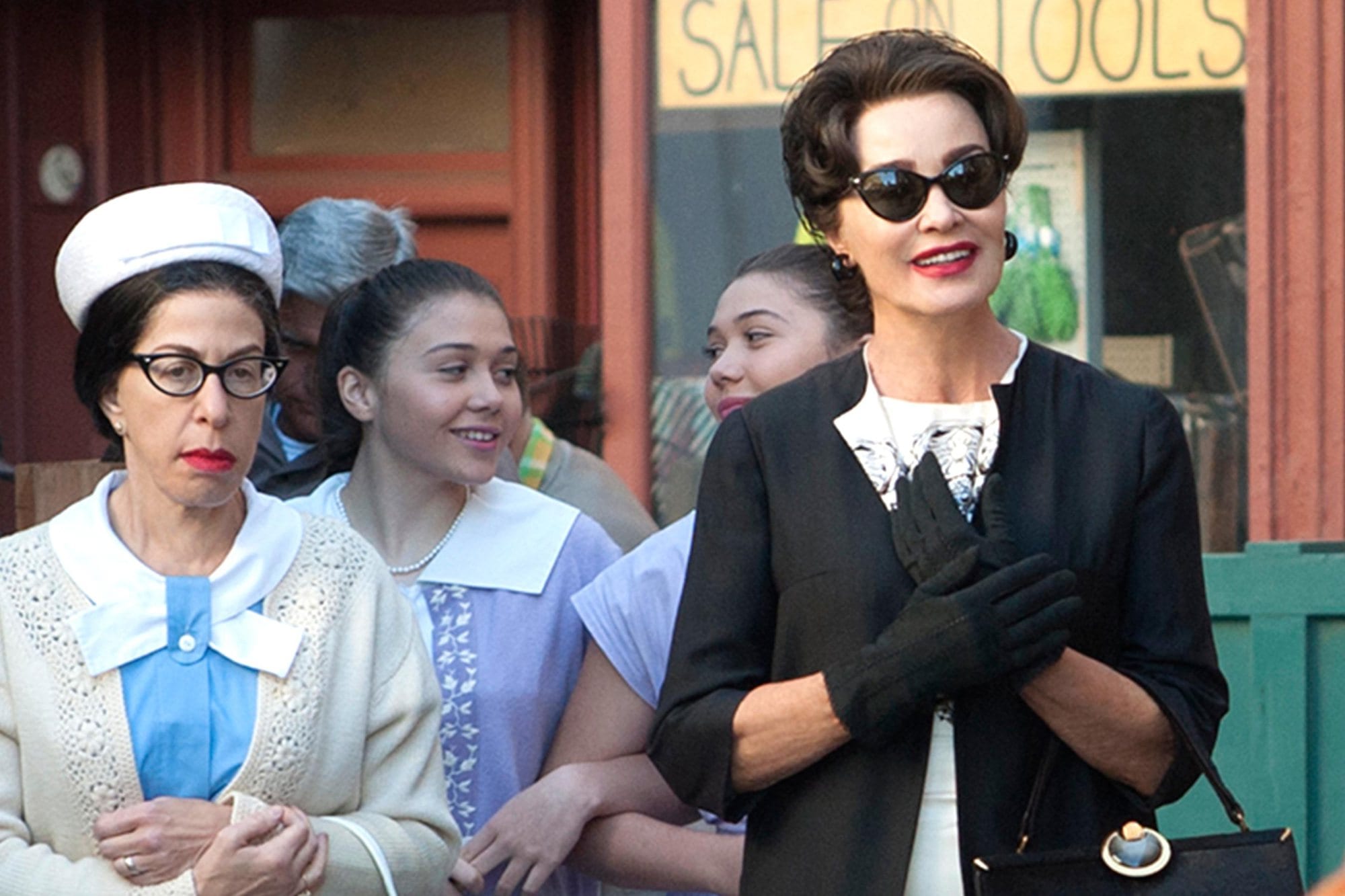‘Feud: Bette and Joan’ Recap: ‘Mommie Dearest’
This week’s episode of Feud aimed to give us a glimpse of Joan Crawford and Bette Davis as we’ve never quite seen them before: as mothers. While history books have framed these two acting icons as less-than-great parents, Ryan Murphy’s vision of them as mothers has a depth and complexity that Hollywood hasn’t ever dared to tackle.
In both Crawford and Davis, we see two women whose prime has passed. They have essentially aged out of their profession, and are simultaneously aging out of their roles as mothers. In this context, both women confront the passing of time with unease — Crawford sees her young twins trying to free themselves from her grip and crumbles in the process. Meanwhile, Davis comes to understand that she’s lost more time than she desires with her youngest child who is institutionalized.
The Pain of Parenting
To say that Crawford and Davis handle the pains of parenting with completely different mindsets is, quite frankly, an understatement. While Crawford is emotional to the point of desperation and instability, Davis finds other things (like her friendship with fellow actor Victor Buono) to occupy her mind. But these stark contrasts in character, emotion, and psychology help us understand who these women are and what they truly want.
Crawford, who adopted all four of her children, yearns to fill the deafening silence of her loneliness. At one point, she comes home looking for her twins only to realize that they’ve been sent off to camp. Immediately, she sinks into her own pit of loneliness and despair. She fears being without anyone to love or love her in return. And this idea is reinforced when after declaring that she would focus more on herself, she climbs into bed with her faithful right-hand Mamacita to ease the pain of her loneliness.
Given how history has remembered Joan Crawford, it’s interesting to see Feud use motherhood to humanize her. Through Jessica Lange’s thoughtful portrayal of Crawford, we see a side of her that even I as a long-time fan hadn’t considered: she’s tender and nostalgic to the point of self-pity. In this episode, we see her craving the love and affection of her children, but struggling to find the best way to get it. So, she makes the move to adopt another child only to be turned down because of her age. It’s a devastating blow and one that only substantiates Crawford’s worldview–that her time and her womanhood are simply running out.
Davis, on the other hand, comes across as slightly more equipped to cope with the gains and losses of parenting. After failing to connect with her institutionalized daughter and learning that her other daughter B.D. is a less than compelling actress, Davis turns those disappointments into a positive by befriending Victor Buono. As the only actor on the set of Baby Jane Davis deems worthy of her attention, Buono serves as a comrade with whom she doesn’t have to compete. They can simply share in the joy of acting and call it a day. In this way, Davis is distinctly different than Crawford: she finds her own footing despite the pain she feels over the cards she’s been dealt as a parent.
In many ways, Buono serves as a proxy for both of Davis’ children. With Buono, Davis can laugh, run lines, and offer advice — all things she simply can’t do with the children she already has at her disposal. Through this strange little friendship, Feud shows us a side of Bette Davis that isn’t defined by her image as an acting heavyweight. We see someone who, like Crawford, craves companionship and understanding.

Mothers and Daughters
In the same vein, Feud also focused on the rivalries each woman seemed to have with their respective daughters.
Last week’s episode established that Davis is struggling to step down from her pedestal to let younger women like B.D. have a bit of the limelight. In this episode, Baby Jane director Aldrich suggests that B.D. take a small part in the film–an idea which Davis initially rejects, but ultimately finds peace with. Initially, Davis works to help her daughter succeed, however, she abandons this effort the moment B.D. proves to be a liability to her legacy. It’s here that she strikes up a friendship with Buono, perhaps to soothe her mind (and her heart). This course of action is strikingly similar to how Davis treated Crawford at the start of production. She latched on for a mere moment, then left Crawford out to dry in favor of cozying up to Aldrich.
While Davis’ little rivalry with her daughter B.D. is on display for the entire cast and crew to see, Crawford’s icy relationship with her oldest daughter Christina is kept under wraps. In the opening scenes, we see Crawford refuse to sign a congratulatory card for Christina, who is having success as a stage actress. Citing the fact that her own mother never congratulated her success, Crawford initially waves the card off, but then thinks better of it. Though it may be Crawford’s nature to be cold and competitive, there’s a bleeding heart in there somewhere that wants to connect…even with Christina.
In the context of Feud, it’s unclear where the disconnect between Crawford and her daughter lies, but I suspect we’ll delve into that more as the season progresses.
Strangely enough, the parenting angle in this episode showed us how easily Crawford and Davis could have found common ground had the Hollywood system not pitted them against each other. For all their differences, their similar parenting challenges were likely the very thing that could have ultimately unified them.
Tara Martinez is a New York-based writer with a passion for pop culture and a penchant for analysis. She frequently covers film, television, and representations of women in the media.




